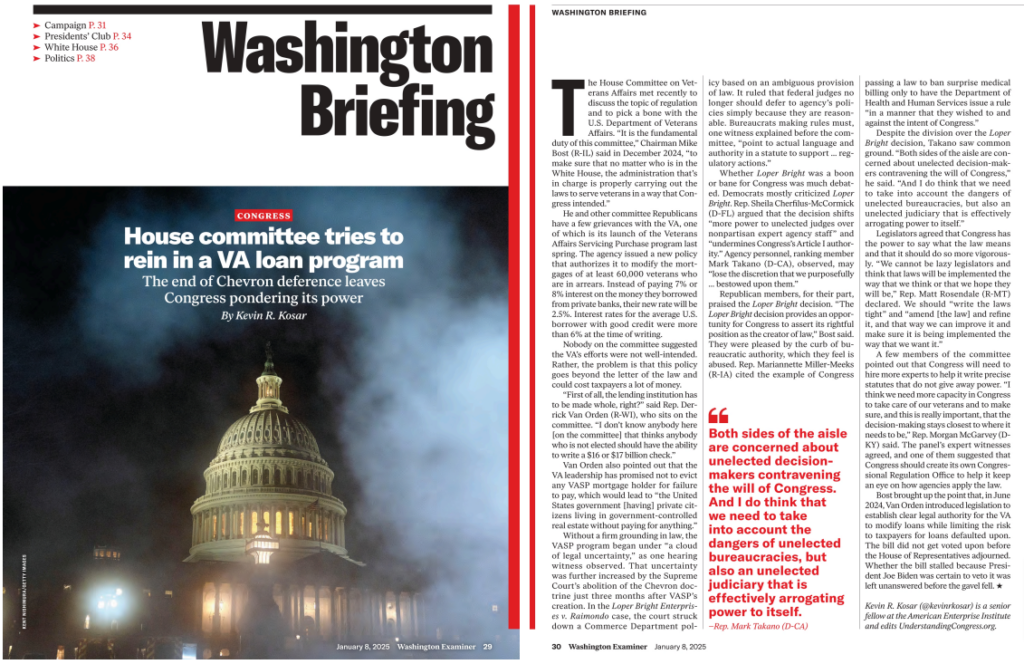
The House Committee on Veterans Affairs met recently to discuss the topic of regulation and to pick a bone with the U.S. Department of Veterans Affairs. “It is the fundamental duty of this committee,” Chairman Mike Bost (R-IL) said in December 2024, “to make sure that no matter who is in the White House, the administration that’s in charge is properly carrying out the laws to serve veterans in a way that Congress intended.”
He and other committee Republicans have a few grievances with the VA, one of which is its launch of the Veterans Affairs Servicing Purchase program last spring. The agency issued a new policy that authorizes it to modify the mortgages of at least 60,000 veterans who are in arrears. Instead of paying 7% or 8% interest on the money they borrowed from private banks, their new rate will be 2.5%. Interest rates for the average U.S. borrower with good credit were more than 6% at the time of writing.
Nobody on the committee suggested the VA’s efforts were not well-intended. Rather, the problem is that this policy goes beyond the letter of the law and could cost taxpayers a lot of money.
“First of all, the lending institution has to be made whole, right?” said Rep. Derrick Van Orden (R-WI), who sits on the committee. “I don’t know anybody here [on the committee] that thinks anybody who is not elected should have the ability to write a $16 or $17 billion check.”
Van Orden also pointed out that the VA leadership has promised not to evict any VASP mortgage holder for failure to pay, which would lead to “the United States government [having] private citizens living in government-controlled real estate without paying for anything.”
Without a firm grounding in law, the VASP program began under “a cloud of legal uncertainty,” as one hearing witness observed. That uncertainty was further increased by the Supreme Court’s abolition of the Chevron doctrine just three months after VASP’s creation. In the Loper Bright Enterprises v. Raimondo case, the court struck down a Commerce Department policy based on an ambiguous provision of law. It ruled that federal judges no longer should defer to agency’s policies simply because they are reasonable. Bureaucrats making rules must, one witness explained before the committee, “point to actual language and authority in a statute to support … regulatory actions.”
Whether Loper Bright was a boon or bane for Congress was much debated. Democrats mostly criticized Loper Bright. Rep. Sheila Cherfilus-McCormick (D-FL) argued that the decision shifts “more power to unelected judges over nonpartisan expert agency staff” and “undermines Congress’s Article I authority.” Agency personnel, ranking member Mark Takano (D-CA), observed, may “lose the discretion that we purposefully … bestowed upon them.”
Republican members, for their part, praised the Loper Bright decision. “The Loper Bright decision provides an opportunity for Congress to assert its rightful position as the creator of law,” Bost said. They were pleased by the curb of bureaucratic authority, which they feel is abused. Rep. Mariannette Miller-Meeks (R-IA) cited the example of Congress passing a law to ban surprise medical billing only to have the Department of Health and Human Services issue a rule “in a manner that they wished to and against the intent of Congress.”
Despite the division over the Loper Bright decision, Takano saw common ground. “Both sides of the aisle are concerned about unelected decision-makers contravening the will of Congress,” he said. “And I do think that we need to take into account the dangers of unelected bureaucracies, but also an unelected judiciary that is effectively arrogating power to itself.”
Legislators agreed that Congress has the power to say what the law means and that it should do so more vigorously. “We cannot be lazy legislators and think that laws will be implemented the way that we think or that we hope they will be,” Rep. Matt Rosendale (R-MT) declared. We should “write the laws tight” and “amend [the law] and refine it, and that way we can improve it and make sure it is being implemented the way that we want it.”
A few members of the committee pointed out that Congress will need to hire more experts to help it write precise statutes that do not give away power. “I think we need more capacity in Congress to take care of our veterans and to make sure, and this is really important, that the decision-making stays closest to where it needs to be,” Rep. Morgan McGarvey (D-KY) said. The panel’s expert witnesses agreed, and one of them suggested that Congress should create its own Congressional Regulation Office to help it keep an eye on how agencies apply the law.
Bost brought up the point that, in June 2024, Van Orden introduced legislation to establish clear legal authority for the VA to modify loans while limiting the risk to taxpayers for loans defaulted upon. The bill did not get voted upon before the House of Representatives adjourned. Whether the bill stalled because President Joe Biden was certain to veto it was left unanswered before the gavel fell.
Kevin R. Kosar (@kevinrkosar) is a senior fellow at the American Enterprise Institute and edits UnderstandingCongress.org. This essay first appeared in the Washington Examiner.
Stay in the know about our news and events.